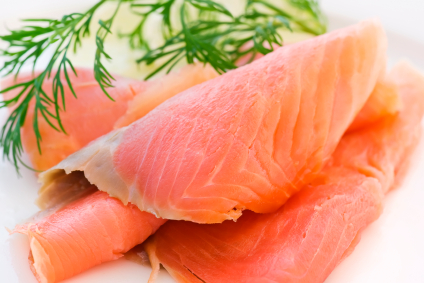
We’ve heard that omega-3 fatty acids, such as those from various fish sources, have important anti-inflammatory, as well as cardiac health benefits.
In fact, WebMD has an Omega-3 Fatty Acid Fact Sheet with so much positive health information that you may add “Buy wild-caught salmon” to your list of things to do on the way home tonight.
In other words, eating fish is a no-brainer, right?
In case you need convincing, this report was published in 2011, “Omega-3 deficiency abolishing endocannabinoid-mediated neuronal function”. While it’s not news that omega-3 fatty acids affect brain function, this Nature Neuroscience article provides new information by elucidating the mechanism by which the brain effects are accomplished.
If you’ve seen a mammalian brain, you know that it is soft and gelatin-like, obviously composed of fatty substances. As this report notes, “Lipid molecules are the building blocks of the CNS”.
The CNS is composed of polyunsaturated fatty acids such as arachidonic acid (n-6) and docosahexanoic acid (DHA; n-3). The precursors of these fatty acids, linoleic and alpha-linoleic acids are not synthesized de novo by mammals. These precursor fatty acids have to be supplied in the diet in order to maintain sufficient brain levels of the building block lipids, long chain polyunsaturated fatty acids (PUFAs).
Mammalian diets deficient in DHA have been associated with reduced cognitive ability and behavior connected to emotional activity. The authors of this study also noted that despite their high caloric content, Western diets are “poor in essential nutrients and notorious for their low levels” of n-3 PUFAs.
In addition, the authors note that babies, both before birth and postpartum, rely on nutrition from their mothers for PUFAs, via placental nutrition and breast-feeding. The negative effects of poor maternal nutrition on fetuses’ and infants’ brain tissue are extended by a lifetime of deficient diet.
In this study female C57BL6/J mice were fed a diet with 6% fat in the form of: 1) a peanut oil rich in linoleic acid, an n-3 deficient diet; or 2) a diet of peanut oil and rapeseed oil that is rich in alpha-linoleic acid (n-3 sufficient diet). These diets were fed throughout gestation and lactation. The mice were fed the same diet for the rest of their lives as a model of lifelong good or malnutrition. The lifelong dietary imbalance in n-3:n-6 fatty acids resulted in decreased brain levels of major PUFAs, such as DHA and EPA, and increased n-6 PUFAs.
The effects of these diets on PUFAs in the prefrontal cortex PFC, normally involved in executive tasks and reward, and more recently to be involved in emotional behavior and depression, were also measured. Diets deficient in n-3 PUFAs resulted in correspondingly reduced n-3 levels in the PFC.
The endocannabinoid (eCB) system is unique in its link of food lipids to synaptic activity and behavior. Two principal eCBs, anandamide (AEA) and 2-arachidonoylglycerol (2-AG), are signaling lipids produced from membrane long chain fatty acids upon neuronal stimulation. The authors note:
The eCB system is involved in synaptic plasticity and its deregulation has been postulated to contribute to the etiology of mood disorders.
After showing that n-3 deficiency modified PUFA levels in the PFC, the authors looked at dietary PUFAs and their influence on eCB-mediated synaptic plasticity. In PFC sections from mice fed an n-3 sufficient diet, they noted normal synaptic plasticity, mediated by eCB. However, this eCB-mediated type of synaptic plasticity was totally ablated in mice fed an n-3 deficient diet.
Furthermore, in the n-3 deficient diet, eCB-mediated plasticity was also found to be ablated in other areas such as the accumbens, a region associated with reward and motivation. Such dysfunction in the accumbens may contribute to mood disorders.
The authors found that reducing the levels of dietary n-3 PUFAS significantly reduced the function of the most abundant G-protein coupled receptor in the CNS, the cannabinoid receptor, CB1R. Data in this study showed that CB1R antagonism occurred as it uncoupled from Gi/o proteins and was partially bound by elevated amounts of eCB near the synapses. This “impairment” was reflected by behavioral changes, such as immobility or lack of normal seeking behavior in a field test and decreased swimming ability in a water test.
While the authors were not successful in showing changes in circulating levels of eCB in the brains of adult mice, there are previous reports of enhanced eCB levels in response to short-term dietary deficiencies in n-3 PUFAs.
A significant consequence of CB1R desensitization (due to antagonism) was blocking of eCG-mediated synaptic plasticity in two brain regions previously shown to affect emotions and mood disorders, the prelimbic region of the PFC and the accumbens.
Lafourcade et al. note that further studies into the effects of diets deficient in n-3 PUFAs on rodent behavior are needed. This report succeeded in linking diet to alterations in function of the CB1R in brain regions associated with emotion, mood and behavior.
In other words, eating fish (or taking omega-3 supplements)–can make you smarter. And possibly happier.
Reference
![]()
Lafourcade M, Larrieu T, Mato S, Duffaud A, Sepers M, Matias I, De Smedt-Peyrusse V, Labrousse VF, Bretillon L, Matute C, Rodríguez-Puertas R, Layé S, & Manzoni OJ (2011). Nutritional omega-3 deficiency abolishes endocannabinoid-mediated neuronal functions. Nature neuroscience, 14 (3), 345-50 PMID: 21278728
Kari Kenefick
Latest posts by Kari Kenefick (see all)
- Fluorescent Ligands in Biological Research: Where We’ve Been, Where We’re Headed - June 27, 2024
- Cell-Based Target Engagement and Functional Assays for NLRP3 Inhibitor Profiling Help Identify Successes and Failures - January 25, 2024
- Illuminating the Brain with a New Bioluminescence Imaging Substrate - April 13, 2023

Fish makes you smart! Need to cut down on beef and increase my fish consumption.
Thanks for the comment! I too need to up the fish intake. Smart is definitely the goal and during the dark, cold season here in Wisconsin, a little extra happy is a good thing. -Kari